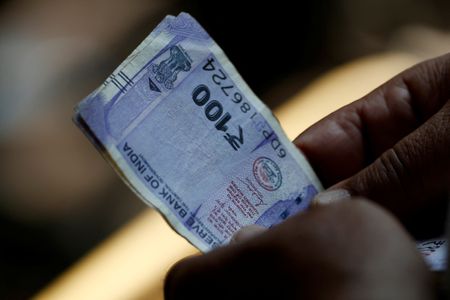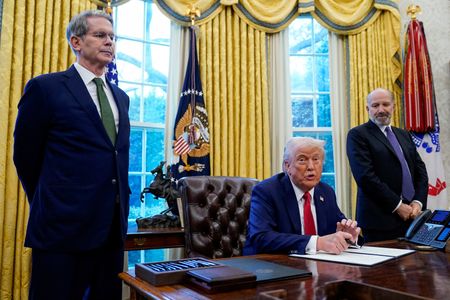By Jaspreet Kalra
MUMBAI (Reuters) – The rupee closed modestly stronger on Thursday, aided by a broadly weaker dollar and inflows as markets grappled with the impact of sweeping U.S. reciprocal tariffs and their impact on global trade and growth dynamics.
India is facing a relatively softer levy of 27% than regional peers such as China, Vietnam and Thailand, which also was a sentimental positive for the currency.
The local unit closed at 85.43 against the U.S. dollar, compared to the close of 85.4975 in the previous session.
It had declined to a low of 86.75 in early trading, but broad-based interbank offers, including those spurred by likely custodial inflows, helped it trim losses, an FX trader at a bank said.
Additionally, a more than 1% plunge in the dollar index – the greenback’s safe-haven appeal dulling due to concerns about how trade policy may impact U.S. growth – helped out the rupee.
Asian currencies kicked off the day on a weaker note, but most trimmed or reversed losses. The offshore Chinese yuan was last quoted at 7.30, retreating from a peak of 7.34.
Despite the initial reaction, analysts reckon that Asian currencies are not out of the woods yet.
“Asian currencies may face increased depreciation pressure as markets turn risk-averse, affecting foreign institutional investor (FII) inflows,” ING Bank said in a note.
On the day, Indian equities fared better than their regional peers with the benchmark Nifty 50 index closing 0.3% lower while Hang Seng fell 1.5% and Vietnamese stocks were down over 6%.
Futures indicated that U.S. equities were primed to open in the red, and the dollar index hit a six-month low. Other safe-havens such as the Japanese yen and Swiss franc soared.
“(I) think it is more of a USD-losing-reserve-currency-status story at the moment,” a Singapore-based trader at a bank said, referring to how FX markets reacted to the announcement of reciprocal tariffs.
For its part, India on Tuesday said was studying the impact of U.S. tariffs and vowed to push for a trade deal this year.
(Reporting by Jaspreet Kalra; Editing by Janane Venkatraman)










